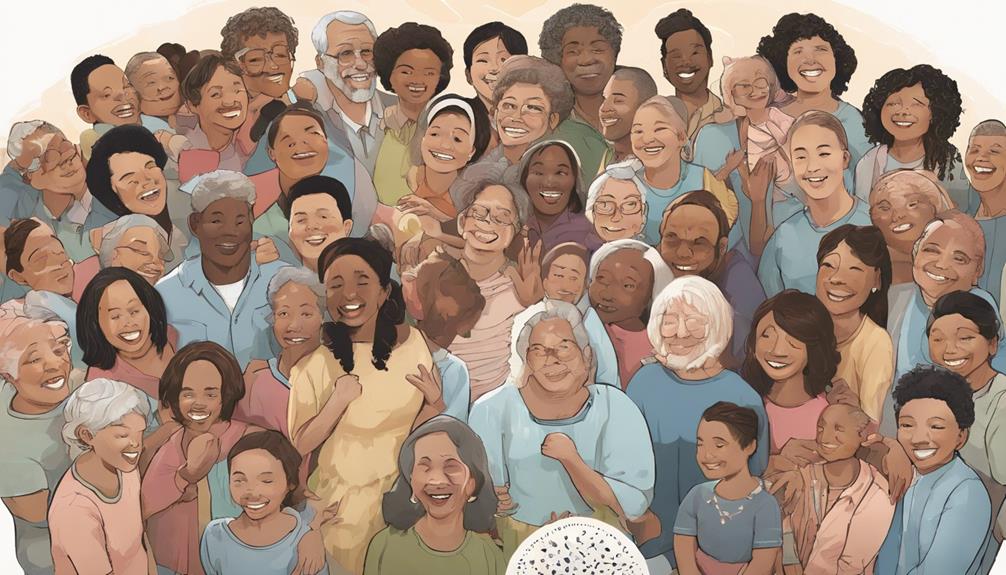When dealing with the challenging process of divorce, it is important to use effective coping strategies to help you move forward.
Prioritizing self-care, seeking support from loved ones, embracing new experiences, establishing healthy boundaries, and focusing on personal growth are vital steps in navigating this challenging period.
These methods offer a roadmap to healing and growth, guiding us towards a brighter future.
Key Takeaways
- Prioritize self-care practices for mental and physical well-being post-divorce.
- Seek support from loved ones to navigate emotions and find comfort.
- Embrace new experiences to discover joy and boost resilience.
- Establish healthy boundaries, especially with the ex-spouse, for emotional protection.
Prioritize Self-Care
Prioritizing self-care after divorce is essential for nurturing your physical and mental well-being as you navigate this challenging period of transition. Coping with the emotional toll of divorce requires intentional efforts to prioritize self-care activities that support your overall well-being.
Engaging in practices like exercise, proper nutrition, and adequate sleep can significantly impact your mental health, reducing stress and enhancing resilience post-divorce. Taking time for activities such as meditation, journaling, or therapy can aid in emotional healing and promote a sense of empowerment.
Seek Support From Loved Ones

Navigating the challenges of divorce can be emotionally taxing, but seeking support from loved ones can provide essential comfort and companionship during this difficult time. It's okay to lean on your family and friends for help when you need it the most. They can make a significant difference in how you feel as you go through this transition in life.
Having someone there to listen when you need to talk, to help with daily tasks, or to simply spend time with you can make all the difference. Your loved ones can offer a sense of normalcy and support that can help you cope with the mix of emotions you may be feeling. By sharing your feelings with those you trust, you can begin to make sense of your feelings and take steps towards healing.
Embrace New Experiences
Embracing new experiences after a divorce can be a transformative journey towards personal growth and self-discovery. Trying new hobbies or activities isn't just about filling time but about building a sense of identity and purpose.
By exploring unfamiliar territories, you can gain a fresh perspective and add excitement to your life. Stepping out of your comfort zone may feel daunting, but it can significantly boost your confidence and resilience during the healing process.
Engaging in novel experiences doesn't just create new memories; it infuses a sense of adventure into your journey of moving on. Whether it's traveling to a new destination, learning a new skill, or meeting new people, these experiences can help you rediscover yourself and find joy in the present moment.
Embrace the unknown with courage, for it's in these moments of exploration that you truly find yourself and discover the beauty of life after divorce.
Establish Healthy Boundaries

As you navigate the post-divorce landscape, establishing healthy boundaries is crucial for your emotional well-being and peace of mind.
- Set clear boundaries with your ex-spouse to maintain emotional and physical space.
- Communicate assertively to ensure your boundaries are understood and respected.
- Establish boundaries around co-parenting responsibilities for a healthy relationship.
- Consistently reinforce boundaries to protect your well-being and peace of mind.
- Seek support from a therapist or counselor to navigate boundary-setting effectively.
During this challenging time, it's essential to prioritize your mental and emotional health.
By defining and enforcing boundaries, you create a sense of control and security in your life. Communicating your needs assertively can help prevent misunderstandings and reduce potential conflicts with your ex-spouse.
Remember that seeking support from a therapist or counselor is a powerful step towards healing and growth.
Your well-being matters, and setting boundaries is a crucial part of moving forward positively after a divorce.
Focus on Personal Growth
To foster personal growth after divorce, individuals can begin by reflecting on their past experiences and exploring new interests and passions. Self-reflection and introspection play crucial roles in understanding oneself better and learning from the challenges faced during the divorce process.
By engaging in activities that spark joy and curiosity, such as picking up new hobbies or delving into unexplored passions, individuals can embark on a journey of self-discovery and fulfillment. Setting goals for self-improvement and personal development can provide a sense of direction and purpose post-divorce, empowering individuals to create a brighter future for themselves.
Seeking therapy or joining support groups can offer valuable emotional support and guidance, aiding in the healing process and fostering resilience. Embracing personal growth as an opportunity for transformation can lead to a stronger, more resilient self, equipped to navigate the complexities of life after divorce.
Frequently Asked Questions
How Do You Mentally Deal With a Divorce?
We mentally deal with a divorce by acknowledging our emotions, seeking support through therapy or trusted friends, and practicing self-care. Setting boundaries with our ex-spouse is crucial for protecting our mental health and fostering healing.
How Do I Overcome Divorce and Move On?
We understand the pain of divorce and the journey to move forward. It takes time, self-care, and support. Grieve the loss but focus on activities that bring joy. Professional help can guide us through healing.
How Can I Afford to Live on My Own After Divorce?
We can afford to live post-divorce by creating a detailed budget, exploring financial resources like alimony or government aid, and considering options like downsizing. Seeking professional advice and finding ways to increase income are key steps.
Who Suffers More Financially After Divorce?
We understand the financial strain post-divorce. Studies show women often suffer a 27% decrease in standard of living, while men may see a 10% increase. This disparity highlights the challenges many face.
How Can I Use Rediscovery Techniques to Cope with Divorce and Move on?
After a divorce, it’s important to rediscover yourself after divorce and find ways to move on. Try rediscovery techniques such as exploring new hobbies, reconnecting with old passions, and investing time in self-care. By focusing on self-discovery and personal growth, you can heal and thrive after a divorce.
Conclusion
As we navigate the challenges of divorce and moving on, it's crucial to remember that we're not alone in this journey.
One interesting statistic to consider is that 79% of people who prioritize self-care during divorce report feeling more resilient and positive about the future.
By prioritizing self-care, seeking support, embracing new experiences, setting boundaries, and focusing on personal growth, we can empower ourselves to navigate this transition with strength and resilience.
Remember, we're capable of healing and thriving after divorce.










